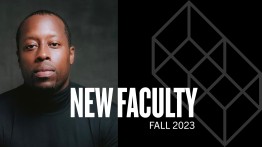Meet Victor Peterson II, Assistant Professor of Humanities
POSTED ON: August 28, 2023

This fall, we are excited to welcome several new full-time faculty members to The Cooper Union’s academic programs. As part of a series introducing this new faculty cohort to our wider community, we spoke to Victor Peterson II who joins the Faculty of Humanities and Social Sciences as assistant professor of humanities. Peterson, who was previously a Cheryl A. Wall Postdoctoral Associate in African American and African Diaspora Literary Studies at Rutgers University, received his Ph.D. from King's College London and holds a degree in arts politics from New York University.
Tell us about your research interests.
My research focuses on global conceptions of blackness. I look at the emergence and evolution of race and processes of racialization across networks of norms and institutions that structure sociocultural and political movements. In cultural studies, this has been formalized by scholars such as Stuart Hall through articulation theory: how relations of dominance and subordination emerge, evolve, and reproduce themselves across states of affairs. I've found that the best place to start to conceive of these formations—by way of their interaction, interconnectivity, as complex adaptive systems, and without reducing them to a singular instance—is to look towards connections made between sound and social movements and culture as infrastructure, from Presence Africaine and Bandung to Black Arts movements. One finds this connection across Black radical and aesthetic traditions.
I'm currently taking up a foundational scholar for Black studies, W. E. B. Du Bois’s suggestion that Black study take inspiration from the physics of social sciences to handle the concept of double consciousness—how racialized individuals must conceive of themselves through their own and others' frameworks simultaneously. I'll be applying this to mosh pits as a model to discuss how ethos (how we are together) and ethics (its description, translation, and transmission) are negotiated on the spot across socio-political formations in such a way that they hold a relation to other, superficially distinct but similar in their deep structure, non-local formations to implement locally and materially relevant but connected effects. Conceiving of blackness as a global, diasporic phenomenon, my interests in the Black and Blue roots of punk and that band/crowd, call/response modality's explicit connection to rearticulating the status quo, the relationships above can be held simultaneously, for it is in the tradition of the Black Arts movement that ethics and aesthetics are one.
What brought you to The Cooper Union?
It was and still is (in some circles at least) foundational that Black cultural studies should be an inter/infra-disciplinary project. I wanted to come to an institution that treated interdisciplinarity seriously, at the curricular level as well as in its orientation towards the environment and institutions with which it interfaces daily. That ecological turning ecumenical concern is crucial to interdisciplinary work. Its location right in the heart of counter/sub-cultural and burgeoning Black Arts movements means that in my everyday and intellectual life, Cooper's presence has been felt in the background of my becoming conversant with the vernacular of the Village and Lower East Side, personally and academically. It's an honor to be invited to become a member of its faculty and run, hand and toe, in and through those fertile grounds once again.
What aspects of teaching are you most excited about in the coming academic year at Cooper?
I am most excited to work with students in a joint participatory research framework. The hope is that this reveals that most of their current academic pursuits have been born out of the humanities. Further, the models we build together to read literature, philosophy, and sociology are just as relevant or even foundational to the models they'll utilize to "read" themselves into the socio-cultural, political, and ecological systems in which their respective disciplines emerged and to which their work will respond in the future.




